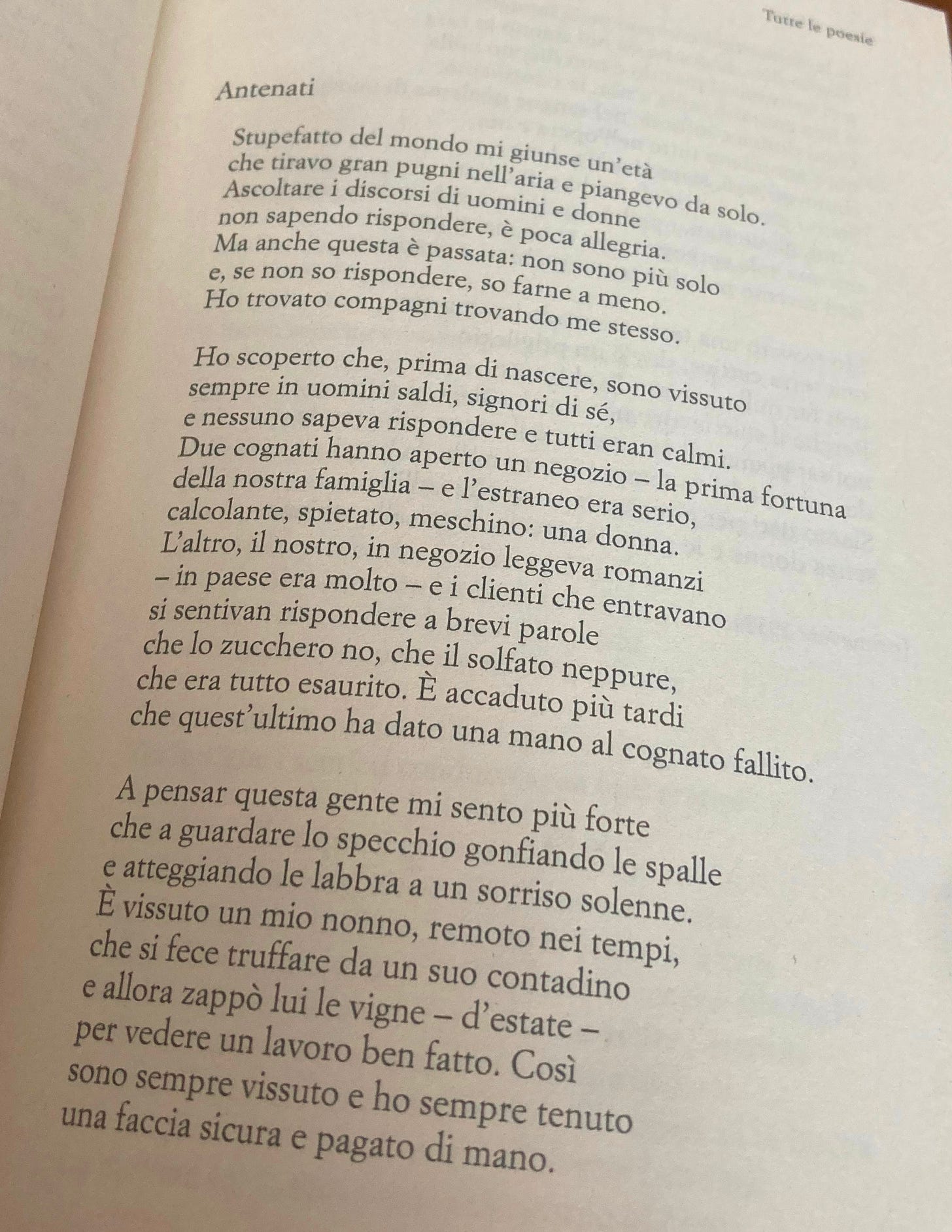The Magic & Beauty of Learning a New Language
And why I cannot resist wanting more, more & MORE of it.
Dear Lite Living Community,
I am writing to you from Lisbon, Portugal—a magical place whose language I don’t (yet) speak and want desperately to learn. In fact, I have a feeling that Portuguese will have to become my seventh language, once my Italian and Spanish stop competing with each other.
This week, I am responding to a prompt from my friend
from LIVING IN 3D who asked me to write about my experience of learning languages, and more specifically about “the magic and beauty of language learning.”Well, this is a subject I am clearly very passionate about, and have written a lot about. The five languages that I speak (Hungarian, Hebrew, French, Spanish and Italian) keep finding their way into my predominantly English prose and poetry. This is not something I consciously do to show off, but something that occurs naturally without me even noticing it. When you have six languages at your disposal, it seems unnatural to reach for the same language, while keeping the five other languages locked away in your tool box.
In this short essay I will address a few of Amy’s questions, and share with you a playful essay I originally wrote in March, 2024 about my adventures in learning languages.
Where does my love for learning languages come from?
I suspect it all started with our move to Israel when I was eight years old, and it wasn’t at all love at first sight. I remember staring at those strange looking scribbles on the blackboard—written in the wrong direction!— and bursting into tears. I didn’t think I would ever be able to master this impossible language. Did I have to? But six months later I was fluent in it. Once this miracle occurred, it was easier to embrace learning English. I was now so motivated that I was half way through my English grammar book before my fourth year English classes even began.
Tips and tricks for learning languages
As with any challenge you want to take on, it all starts with the right mindset. If you tell yourself, “oh, I wish I could speak [insert your desired language here], but I have no talent for learning languages,” you basically set yourself up to fail before you even began! What you have communicated to your brain is that “you have no talent for learning languages” and therefore every obstacle that you will encounter (of which there will be many!), will be a proof of this prophecy.
By contrast, if your mindset is “[your desired language] might be challenging to learn, but let’s see how well I can learn just [a simple, desired goal like ordering a meal at a restaurant]” you approach the challenge from a place of curiosity!
As with any desired change, set-backs are part of the process, so another great ‘tip’ I have for you is to master the art of self-compassion. Forgive yourself for your ‘failures,’ whether it is repeating the same grammatical mistakes over and over again, or not advancing fast enough, or… ‘sounding like an idiot’, because, actually —
Why you should learn another language
—the best thing about learning another language is that it humbles you! Feeling like a complete idiot, or at the very least, a complete beginner at something is (in my humble opinion) a very healthy thing! Nothing to humble our self-inflated ego like going back to the basics: I am… I want… I need… Please, could you help me? It is all the more useful if you happen to have a PHD and consider yourself somewhat smart. Learning a new language will quickly demonstrate to you how little you know, and how much more you have still to learn about various subjects. I have long fantasized about Donald Trump having to learn Spanish before he could become the President of the most powerful country in the world and call Mexican immigrants “drug dealers, criminals and rapist.”
I realize that this very fear (sounding like an idiot) is the reason why so many people never brave learning a new language. And this is why I am so determined to change your mindset and hope to convince you that what you perceive as the most negative/ frightening aspect about learning a new language, is in fact its greatest gift! And yes, learning a new language is also good for your brain and might decrease your chances of getting dementia (the jury is still out on this last claim).
I have made so many embarrassing mistakes in various languages, including ordering half a pint of penis in a bar, talking about my girlfriend’s warm vagina flying into my shirt, and asking to have someone’s baby when all I wanted was a drink. I nearly died of embarrassment at the time, but these mistakes make great stories (and poems!) and endeared me to the people listening to me, who very much appreciated my efforts, no matter how badly I kept on butchering their beautiful language.
Which brings me to the last, and most important tip when it comes to learning a new language:
It is absolutely vital that you keep a sense of humour!! Learn to laugh about your mistakes and move on. Learn one small thing at a time, before you advance to the next small thing, and then the next small thing, and before you know it - these small things become one big thing and you are suddenly able to understand 60% / 70% / 80% of what people are saying, express yourself like a semi-idiot in a heavy accent, until—maybe, with a bit of luck and lot of patience, dedication, persistence and a healthy doze of sense of humour, one day you find yourself write like a semi-intellectual in your second/third and fourth language! And, yes, it is entirely possible. I am writing this in my third language, hoping to sound semi-wise ;)
Bonus tip…
And please make it enjoyable!
Choose the means that is most enjoyable to you. Whether it is joining a class in person, or on line, hiring a tutor, joining a conversation group, or—choosing to immerse yourself in the language and culture by spending an extended time in the country, just make sure you choose something that would bring you joy. Immense joy if possible.
I geek out on literature. I am more likely to read Dante in Italian and Gabriel Garcia Marquez in Spanish than a children’s book in those languages, because high literature and poetry will hold my attention and appeal to my senses. Yes, it is definitely harder work, but I happen to like it. During the pandemic it was Dante’s Divine Comedy that got me through the worst days. One canto a day (first in Italian, then in English, then again in Italian) became my morning ritual ( or, ‘incantation’ as my daughters mocked my obsession) and my natural anti-depressant.
But if watching your favourite TV series on Netflix in Spanish is your thing, I’d say, go for it! I have paid for a VPN only so I could have access to the Italian Rai Play and watch Italian films with Italian subtitles. This is how I relax. For real.
If you have more specific questions about my process, and need more encouragement from me, please do not hesitate to ask!
And be sure to check out Amy’s upcoming post this Tuesday with more tips and tricks on learning a new language!
And now, as promised, here is a playful essay I wrote on my adventures learning languages, which was also part of a larger fictional story, En attendant Guillaume, published in the TNQ last year.
The Olympics of Languages
When I was failing my English classes at primary school, I could never imagine that one day I’ll be writing plays, screenplays, poetry and prose in English. Nor that I would be speaking six languages (imperfectly). To learn English was a privilege afforded only to a selected group of students in communist Hungary and I remember cursing the fact that I w…







I didn't know you and Amy were friends, Imola! I get so tickled when I see the same people in the communities here on Substack. Let me just reiterate what I love about you: that you are unabashedly YOU. I am still laughing from the comment you made on one of our recent voice messages via WhatsApp about my experience at the writing conference. Knowing you and reading your incredible writing is like a sigh of relief, truly, for me. You give me permission to just show up as I am and not feel like I have to conform to some stuffy ideal in the literary world. Love you, friend! XO
This essay really resonated with me, especially your point about how "the best thing about learning another language is that it humbles you! Feeling like a complete idiot, or at the very least, a complete beginner at something is (in my humble opinion) a very healthy thing!" It's such a freeing perspective, isn't it? We spend so much of our lives trying to project an image of competence and knowing, especially as adults. But there's a unique joy and accelerated growth that comes with letting go of that need and truly embracing the beginner's mind, even if it feels a bit silly. I've found that some of my most profound learning experiences have come when I've willingly stepped into a situation where I know absolutely nothing and have to rely on raw curiosity and a willingness to make mistakes. It strips away the ego and allows for a more direct, unfiltered engagement with the new material, or in this case, a new language and culture.